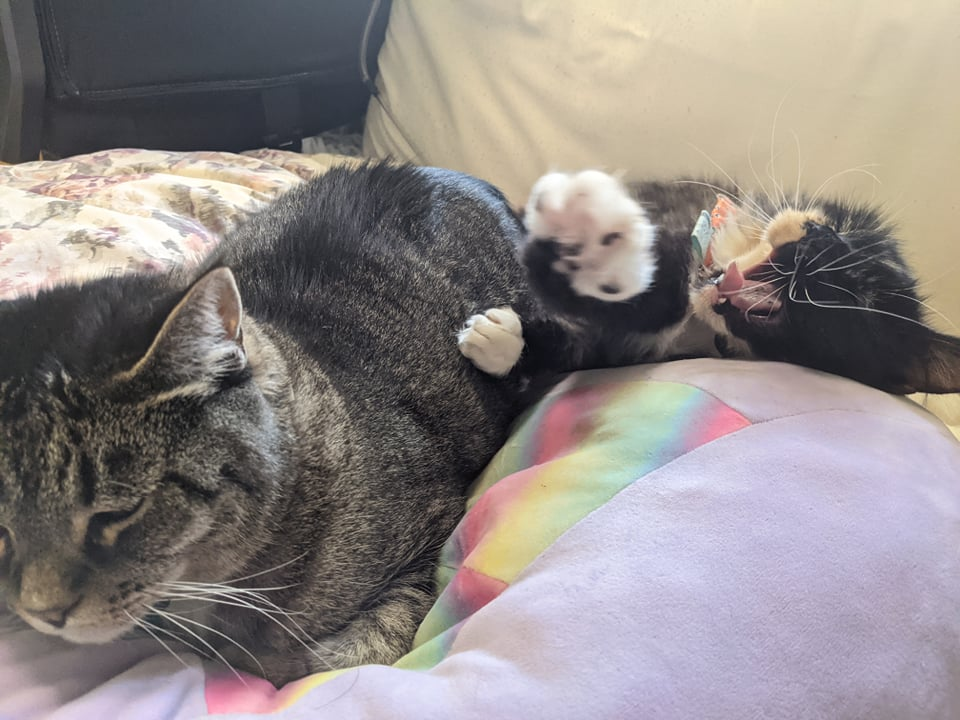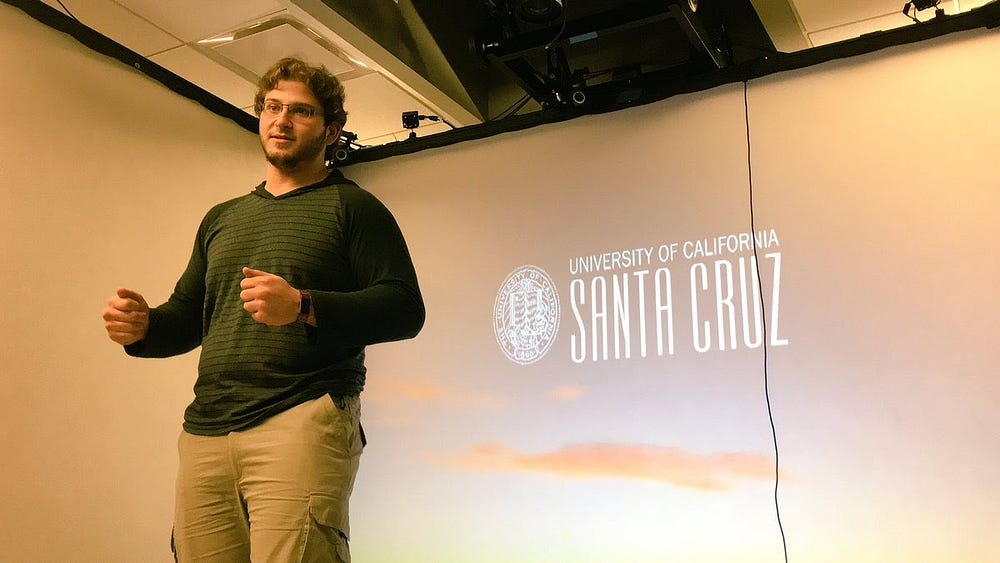
Hi Aviv, thanks so much for joining us! To get started, can you please give us an overview of your background?
Sure thing! I’m a researcher and PhD candidate from University of California, Santa Cruz exploring Extended Reality and Assistive Technologies. My primary work explores how immersive virtual reality, affective computing, and wearable technology can help people better get into flow during physical rehabilitation and exercise. I aim to augment assistive technologies through gamification by creating interactive experiences that are both physically and emotionally intelligent in assisting users with and without disabilities.
I’ve had a journey of varying experiences such as optimizing autonomous drones with NASA Researchers, working security for Super Bowl 50, creating efficient traffic management systems during sleep deprived hackathons, assembling high voltage electric car circuits while burning my fingers soldering, coaching K-8 judo + wrestling, fiddling around with robotic exosuits (+ building robotic doggos), and investigating interactive virtual environments while working with Warner Bros Entertainment, Walt Disney Imagineering, Google Daydream, the National Institutes of Health, and Facebook Reality Labs. Oh, and I have two fluffy kitties named Amy and Jack.

What inspired you to get into immersive tech? Please tell us a bit about your journey to getting into the VR industry.
I didn’t really know what I wanted to do with my career going through college, but knew I wanted to do something with technology as I loved video games and digital media growing up as a child (spent way too much time on Minecraft, Mass Effect, and Bioshock back in the 2010s). Because of this, I tried to do everything when I entered college (resulting in the wacky journey from my background).
I was inspired to get into immersive tech after completely rupturing my right tricep ligament in a judo competition and undergoing reconstructive surgery. After a couple months of physical rehabilitation, Oculus and HTC Vive started releasing more affordable consumer headsets — eventually I tried one out at a friend’s place and was immediately hooked on how engaging the virtual experiences were (and how I started exercising my elbow while being distracted from my usual discomfort).
During this time, I was invited to become an undergraduate researcher at the UC Santa Cruz ASSIST Labs to explore how games could assist in stroke rehabilitation. I immediately became determined to explore how VR could be utilized to assist stroke survivors with exercise games! Over the next year, I had the privilege to work with many passionate therapists, stroke survivors, and disability learning centers to co-design a new type of exercise game for Constraint Induced Movement Therapy. This led to the development of Project Star Catcher, where we found VR exergames could improve therapy adherence by over 40% between hemiparetic limbs!
Since then I’ve been continuing to research immersive technologies, exercise games, and artificial intelligence tools around VR for healthcare!
What were some of your biggest challenges you experienced while creating this project?
Many! It’s always hard to juggle time, collaboration, and funding as there’s only 24 hours in a single day — especially when you’re a student, researcher, and co-founder. When completing my engineering bachelor’s degree in 3 years while balancing research, I ended up gaining 40 lbs of weight as I would use sweets to stay up all night while working. As a graduate student, I’ve learned that daily exercise, ensuring you spend time with your loved ones, and taking a step back from work when needed can lead to far more productive and passionate research.
Can you tell us more about what you’re currently working on?
More recently, I’ve co-founded Immergo LLC. With support from the National Science Foundation, we’re researching new XR tools to help physical and occupational therapists with remote physical rehabilitation. I’m also wrapping up my PhD dissertation this fall on the design and evaluation of VR exergames for physical therapy (here’s a high-level sneak peak for anyone interested).
What were some of the most considerable challenges you’ve faced while working in the VR industry? How did you overcome them?
From an industry perspective, I have never been formally trained in many of the positions I’ve held (electrical engineer, tech prototyper, creative simulation developer, and user experience researcher). A lot of these opportunities arose from self-learning development and research skills around virtual reality as a student and taking a leap of faith into an unfamiliar industry position. At first, I felt a lot of imposter syndrome and negated my work-life balance to try to compensate for my insecurities. Overtime, I found that approaching these new challenges, especially those outside of your comfort zone, can be incredibly exciting from a learning, growth, and collaboration perspective! Now when facing the unknown from many development areas of XR, I’m always excited to learn and advance my skill set even if things don’t always work out. I believe the common phrase is: “It’s not about the destination, it’s about the journey.”

What’s your vision for the future of VR?
Definitely beyond gaming. VR is powerful, it lets us defy reality and create most any experience. If we can create any world, any reality, then what worlds can best help people with their needs? I think VR could grow and mesh with the physical world in so many ways: increasing access to healthcare, redefining the future of education, pushing the boundaries of art, and so much more. The ability to be co-present and immersed all through a pair of goggles has so many design opportunities.
What parts of the VR industry do you think need to be changed? Why?
Regardless of where we go with VR, I think it’s critical that we ensure our stakeholders are directly involved in the design process. If VR grows, and begins to offer significant advantages, co-designing is critical to ensure that no one who wants VR will be left behind. Today, most VR experiences aren’t truly accessible. For people with motor disabilities, alternative controllers aren’t often supported. For people with low hearing or vision, captions and display customization aren’t a standard for most VR experiences. For VR to truly make an impact (and one that is equitable) we need to ensure that these communities are heard and supported at the beginning of the XR design process.
What are your thoughts on privacy and ethics?
Many affordable VR business models today are centered around capturing user data. VR headsets are becoming increasingly better at capturing that data: adding additional cameras to improve tracking, employing algorithms that track the physical world around us for safety and convenience, and are beginning to even incorporate face/eye tracking to improve our social-emotional interaction. To me, I believe it is absolutely critical that VR providers are transparent (and understandable) about how this data is being used. For example, why is this data being collected, who has access to it, and where is it being stored. Additionally, users should have the choice to opt-out of this data tracking in the freemium model with alternative options (e.g. pay a subscription fee to remove advertisement access). From an ethics perspective, it’s not as simple as saying “don’t do any evil.” Most individuals are not ethicists, and everyone has their own assumptions and biases. Again this is why it is critical to involve your stakeholders, people, directly in the design process, especially in ensuring that your XR experience is ethical and truly utilizes acceptable privacy practices.
What advice do you have for people (professionals/ students) looking to enter the XR industry?
As someone who is self-taught in XR (Unity, Unreal, User Experience), don’t be afraid to jump in. As long as you find your passion and approach XR with a growth mindset, I believe anyone can enter the XR industry. I’d recommend reaching out and grabbing (virtual) coffee with others in the XR industry to learn about their career journeys. Or even join hackathons and online tutorials/classes (even if you’ve never programmed in your life).
Who have been your most important mentors? Why? How did you meet them?
To my family, it is their love and support that drives me forward. To my friends and colleagues, it is their engagement and energy that keeps me running. To my advisors and mentors, it is their encouragement, patience, and guidance that has helped me find my way. I simply couldn’t have done it without them. They have forever changed my life, and I will always be grateful.
Anything else you’d like to add?
Happy to chat about life, the universe, or anything else! I welcome new opportunities as well as collaborations and invite those interested to reach out to me.
Bonus: What’s your favorite inspirational quote? What about the quote inspires you?
“I may not have gone where I intended to go, but I think I have ended up where I needed to be.”
― Douglas Adams, The Long Dark Tea-Time of the Soul
***
Find Aviv on LinkedIn, Twitter and learn more about his company, Immergo Labs
Know someone who should be interviewed for an XR Creator Spotlight? Please email us at [email protected].





